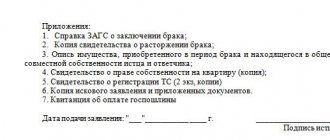10
Most married couples do not think about the distant future. Young people legalize their relationships, give birth to children, arrange their daily lives, start a business, and plan a vacation. Over the years, the spouses acquire certain property. Spouses receive part of their assets as an inheritance - from their relatives or by will. This often happens during marriage.
Is inheritance considered joint property? Can it be divided between spouses during a divorce? Let's figure it out.
We recommend that you familiarize yourself with the nuances of dividing property during a gift in the article “Division of donated property during a divorce.”
Concept and examples of jointly acquired property
Art. 244 of the Civil Code of the Russian Federation establishes the concept of common property. This is a situation when 2 or more people own one indivisible object without allocating shares in ownership.
Art. 33 of the RF IC establishes that if the spouses have not entered into a marriage contract or division agreement, then all property purchased during marriage with joint funds is considered common.
That is, if from the moment the marriage was registered until the divorce was filed, the husband and wife acquired property, then it is considered common, even if it is registered in the name of only one of them.
Example. Ivan decided to buy a car with the money given for his wedding. Since he was the only one with a driver's license, he registered the title in his own name. But in case of division of property, the vehicle will be divided between the spouses in ½ shares. Since money donated for a wedding is considered joint.
The joint property of the spouses will be considered:
- property donated for a wedding;
- property purchased during marriage with common money;
- income of each spouse (salary, pension, benefits, financial assistance);
- income from business activities.
The joint property of spouses is subject to the right of common joint property. This means that each of them is the full owner of the object. And in case of division of property, each of them can claim ½ share.
Treaty regime
The contractual regime of common marital assets comes into force from the date of registration of marriage, on the basis of an agreement concluded between husband and wife before or after the legalization of their relationship. This agreement regulates the property rights of each spouse, both present and future (or at choice). According to the content of the agreement, the status of the inherited property can also be changed - it is strictly determined by its legal owner or, conversely, classified as common property.
An important criterion is the legal significance of the document, which is possible only under the following conditions:
- notarization;
- capacity of both parties;
- free expression of the spouses when determining the content and concluding an agreement;
- the absence of illegal provisions and clauses taking into account the human dignity and marital status of any of the parties;
- presence of personal signatures of husband and wife.
The provisions established by the contract can be canceled only by mutual agreement.
Inherited property – joint property?
Property that a spouse received under a gratuitous transaction is considered personal (Article 36 of the RF IC).
Inheritance is just a gratuitous transaction. Objects received as an inheritance are not subject to the rules on joint ownership. Except in cases where both spouses become heirs of the property.
Example. Valentina bequeathed an apartment to her son and daughter-in-law. The spouses did not divide it and registered it as joint property.
Trust management of inherited property
Validity of a marriage contract in the event of the death of one of the spouses
Property received by inheritance
Initially, an inheritance is the personal property of the person who received it. But there are circumstances as a result of which an accepted inheritance may become the common property of the spouses:
- the value of the inherited property has increased due to the attraction of funds from the family budget for reconstruction or repairs;
- sale of the inheritance of one of the spouses and acquisition of other property during the marriage;
- conclusion of a marriage contract, according to which the accepted inheritance is transferred to the second spouse as shared or full ownership. The agreement can be drawn up before marriage and during the period of marriage.
- in the event of the death of the spouse who received the inheritance and did not leave a will. The second spouse will claim the property of the deceased along with other first-degree heirs.
Can a wife claim her husband’s inheritance: during a divorce, after his death?
How to divide the inheritance?
However, in certain situations, personal property can be divided in the same way as joint property. To do this you need to conclude:
- Marriage contract.
- Property division agreement.
The peculiarity of these options is the voluntary consent of each spouse to formalize the division. Otherwise, the notary will refuse to certify the document.
Marriage contract
The contractual regime of spouses' property is established by Chapter. 8 IC RF. To ensure that property is divided during marriage and during divorce differently from what is established by law, the parties can enter into a prenuptial agreement.
Features of the document:
- It is issued before the registration of the marriage union or during the period of official marriage.
- If concluded before the wedding, it comes into force only after the official registration of the marriage.
- If concluded during marriage, it begins to be valid from the date indicated in it.
- The parties can divide common and personal property at their own discretion.
- The document cannot provide for conditions regarding personal non-property relations and children.
- The document is valid during the marriage, and the divorce provisions apply even after the marriage is dissolved.
- The contract must be certified by a notary.
- The agreement may provide for the division of property that the spouse has inherited or will inherit.
- If the terms of the contract put one of the spouses in an extremely unfavorable financial situation, then it can be challenged in court.
Thus, a marriage contract may provide for the division of the inherited property of one of the spouses with his consent.
Example. Victoria and Mikhail entered into a marriage contract. They provided that Mikhail transfers 1/3 of the inherited apartment to Victoria. And the woman invests money from her salary in renovating her apartment.
Partition Agreement
If the spouses do not have a dispute regarding the shares, then an agreement can be drawn up. In accordance with Art. 254 of the Civil Code of the Russian Federation, by default, spouses receive equal shares in the common property. But when dividing the inheritance, that is, the personal property of one of the spouses, the parties have the right to independently determine the size of the shares.
Features of the agreement:
- Concluded during the marriage or no later than 3 years from the date of registration of the divorce.
- The document comes into force from the moment of notarization or from the date specified in the agreement.
- The agreement may provide for the division of only the property that the spouses already have. That is, it is impossible to include a clause about inheritance that will only be received in the future.
Example Alina inherited a car from her grandfather. During the marriage, her husband constantly used it. During the divorce, the man wanted to keep the vehicle, but it was not joint property. Then the couple decided that the husband could take the car, but he would refuse ½ share in the country house in favor of his wife.
Exceptions
According to Art. 256 of the Civil Code of the Russian Federation, the legal regime of property of a husband and wife can be changed and, in certain provisions, challenged in court. This concerns, first of all, the status of the individual assets of the spouses.
Inherited material goods can be included in jointly acquired property if they were significantly improved at the expense of common family income or the personal property of the spouse who was not the heir to this object.
Significant improvements mean major repairs, reconstruction or refurbishment of a property that exceeds its original cost.
To recognize the inheritance as joint property, the interested person (plaintiff) submits his claims in the form of a claim to the court at the place of residence of his spouse or at the location of the disputed property. And the court, based on the evidence provided by it, makes a decision to refuse or satisfy the presented claim.
Example. After marriage, the wife receives by inheritance a dilapidated house with a neglected garden plot. Together with her husband, she improved the resulting property for several years, as a result of which the house acquired a residential condition, and the plot became a source of income thanks to the cultivation of fruit and vegetable crops on it. After a divorce, the husband has every right to go to court with a claim to recognize the land and housing inherited by his wife as their joint property. He will support his demands with testimony from witnesses, preserved receipts and checks for the purchase of building materials, as well as acts of appraised value of property, relevant at the time of registration of the inheritance and at the time of opening the case.
The dispute does not make sense if the marriage contract clearly defines the rights of the spouses regarding joint assets and improved individual property, among other things.
How to recognize an inheritance as jointly acquired?
In accordance with Art.
37 of the RF IC, an inheritance can be recognized as joint property if the value of the inherited property has increased significantly due to the money or labor of the second spouse. As judicial practice shows, this is not easy to do. The courts satisfy the applicant's demands only if there are results of a construction and technical examination, which indicate an increase in the cost of housing due to the improvements made. Otherwise, it will not be possible to prove that the changes increased the cost.
Example. Karina inherited an apartment during her marriage. The housing was old and needed renovation. The couple installed an electric boiler, installed a new front door and plastic windows. Cosmetic renovations were also carried out. As a result, the appearance of the room has changed greatly. Since Karina was on maternity leave, the costs of repairs were mainly borne by her husband. The man collected all the checks (for 200,000 rubles) and during the divorce asked to recognize the apartment as joint. But the court ruled that persons living in the apartment are required to bear the costs of maintaining the satisfactory technical condition of the apartment. The man did not provide evidence that the cost of the apartment had increased significantly, so the court refused to satisfy the demands.
Improvement
What is meant by improvement? This is an investment of money and labor resources, thanks to which personal property has improved and increased in value.
The wife inherited a dilapidated house from her parents. Due to the lack of other housing, the couple moved into a house for permanent residence.
Over the course of several years of living, my husband made significant changes to the house - bricked and tiled, made repairs, replaced electrical wiring, installed communications, installed new windows and doors. Funds from the family budget were used for all this.
Equally important were the husband’s special skills and experience, as well as the time and effort he expended. As a result of the improvements, the house's value increased significantly. In case of divorce, the husband can claim it as joint property, despite the fact that the house is the personal property of the wife.
To do this, the man will need to go to court with evidence of the improvements made (investment of finances, time and effort). Such evidence will be checks, contracts, receipts, witness statements, photographs, etc. (see “Division of property acquired before marriage”).
How is inherited property inherited?
If a spouse dies, the estate includes:
- ½ share of all jointly acquired property;
- personal property and copyright in full.
Thus, objects received as an inheritance are fully included in the hereditary mass.
Example. Kirill inherited an apartment. They lived in it with their wife, Ulyana. From his first marriage the man had 2 children. During the marriage, the couple purchased a car, a summer house, and household appliances. After his death, the inheritance property included: an apartment, ½ share in a car and a dacha. Household appliances are transferred to the heir who lived with the deceased and used them. That is, the spouse received 1/3 share of the apartment, 4/6 share of the car and dacha, household appliances, and the children received 1/3 share in the apartment and 1/6 share in the car and dacha.
Marriage contract
This is a mutual voluntary agreement signed between spouses or future husband and wife. This document is also certified by a notary and the original is kept with him.
If it is necessary to make certain changes to it, this can only be done through a notary.
In a marriage agreement, spouses can provide for various property relations, as well as other obligations to each other.
This contract helps to avoid most controversial conflicts between spouses during their family life, as well as during divorce.
Under this agreement, the couple can determine various conditions for dividing property. Thus, one of them can refuse in favor of the other.
This agreement is often used when a spouse inherits expensive property, which he is forced to sell and purchase a new one with these funds.
The second spouse, according to the marriage agreement, refuses to claim the acquired property, or his share in this property is determined.
So, it turns out that new property was acquired during marriage, but it will be divided in the order that was provided for in the marriage agreement.
In addition, the agreement may provide for the division of all property in half, even that which was received by each spouse by inheritance or as a gift.
In this case, the division of property will be carried out in accordance with the drawn up agreement.
Does the child have the right to a share in the property that the parent inherited?
Children and parents have no rights to each other's property. Therefore, if a child becomes an heir to property, the parent cannot sell or change it at his own discretion. Sales are permitted only in exceptional cases and with the consent of the district guardianship department.
In the event of the death of a parent and in the absence of a will, the child receives priority rights to all of his property. In this case, he can receive a share of the object that was previously inherited by the parent. But only if at the time of death the parent continued to be the owner of the object.
Inheritance of property by will
If the deceased left a will, then it is necessary to dispose of his property following the rules of the document. The terms of the will are paramount and are not subject to consideration.
The inheritance will be divided according to the order prescribed in the will, but the notary will have to verify the validity of the will. With the help of special inquiries, the lawyer will find out whether the will was canceled or re-registered.
There are certain exceptions to this rule for drawing up a will, according to which the testator can never deprive the following citizens of a share of the inheritance:
- minor children;
- pensioners;
- disabled parents or spouse;
- incompetent individuals;
- dependents.
This rule is a state regulation and therefore cannot be challenged in court proceedings.
Spouse's rights during inheritance
Their circle largely depends on the scheme by which the inheritance is formalized. The law associates its own characteristics with the presence of a will.
What matters is the number of heirs claiming one piece of real estate or other property. Then an agreement is concluded between them on the distribution of values.
It also happens that the heir proves his preferential rights through the court. The argument is the constant use of the thing.
We recommend! Registration of inheritance after the death of close relatives with a notary: deadline for submitting an application for acceptance of inheritance and necessary documents
In law
The surviving spouse by virtue of Art. 1142 of the Civil Code of the Russian Federation applies to heirs of the first stage. Together with him, the parents and children of the testator have the right to claim the property. Everything is distributed among first-degree relatives in equal parts.
The exception is the situation when one of the family members renounces his share in favor of another. Such an action must be notarized.
When the surviving spouse is the only one in line, all property goes to him. And the heirs of the lower levels are unable to do anything about it.
Inheritance in the presence of a will and other heirs
During his lifetime, a citizen has the right to bequeath property not only to relatives, but also to other persons. There are cases when property went to organizations, the state or municipalities.
If the surviving spouse is not mentioned in the will, it is possible to receive part of the inheritance as part of the obligatory share. It is available to people with disabilities, as well as those who have reached the pre-retirement and retirement age established in the country.
The size of the guaranteed portion is half of what the person would be entitled to in the event of inheritance by law. However, under certain conditions, the court has the right to reduce the share or even cancel it altogether.
Preemptive right
It has to be determined in the case when there are several contenders for an indivisible thing. The principles for the distribution of property are given in Art. Art. 1168 and 1169 Civil Code.
When the property was in common family ownership during the life of the testator, the surviving spouse always has priority over others.
So, if the apartment was the personal property of the deceased spouse, the fact of living together in it during the life of the citizen comes to the fore. The situation is similar with household items.
In the event that property goes to one person, other heirs have the right to count on monetary compensation for their shares. It is determined based on the estimated value generated at the current time.






